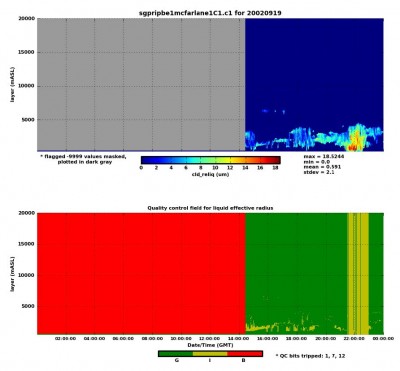Five Years of Radiatively Important Parameters Best Estimate (RIPBE) Data Now Available
Published: 31 January 2012
Scientists use detailed state-of-the art radiative transfer models to understand the radiative impact of clouds and aerosols on the Earth’s radiation budget, evaluate remote-sensing retrievals of cloud and aerosol properties, and develop and evaluate simpler radiative transfer models for inclusion in cloud and climate models. The ARM suite of instruments measures all of the radiatively important parameters in the atmospheric column that need to be included in these radiative transfer simulations, but they are measured at different temporal and vertical resolution, and combining them on the same grid can be difficult and time-consuming. To save users that effort, ARM has created the Radiatively Important Parameters Best Estimate (RIPBE) value-added product (VAP), which combines a complete set of radiatively important parameters within the ARM measurement column on a uniform vertical and temporal grid with quality control and source information.

Five years of RIPBE data (March 2002–July 2007) at the Southern Great Plains site are now available in the ARM Data Archive. This data set contains vertical profiles of cloud, aerosol, temperature, and water vapor; band-averaged surface albedo; mixing ratios of CO2 and other trace gases; and observed surface fluxes at 1-min resolution. In order to provide as continuous a data set as possible, missing or bad data are filled in wherever possible. Quality control flags indicate questionable data, and source flags indicate whether each data value is directly measured, interpolated, or from a climatological value. Further details of the RIPBE product can be found in the technical report.
More recent data will be processed as the input datastreams become available. The next steps in RIPBE development will be creating two average products—one for climate modelers on the same time grid as the current Climate Model Best Estimate (CMBE) product and another for radiative closure evaluation that will be centered on satellite overpass times.
To access these data, log in to the Data Archive. (Go here to request an account.) Send any questions or comments about these data to Sally McFarlane.
The ARM Climate Research Facility is a DOE Office of Science user facility. The ARM Facility is operated by nine DOE national laboratories, including .
Keep up with the Atmospheric Observer
Updates on ARM news, events, and opportunities delivered to your inbox
ARM User Profile
ARM welcomes users from all institutions and nations. A free ARM user account is needed to access ARM data.


















